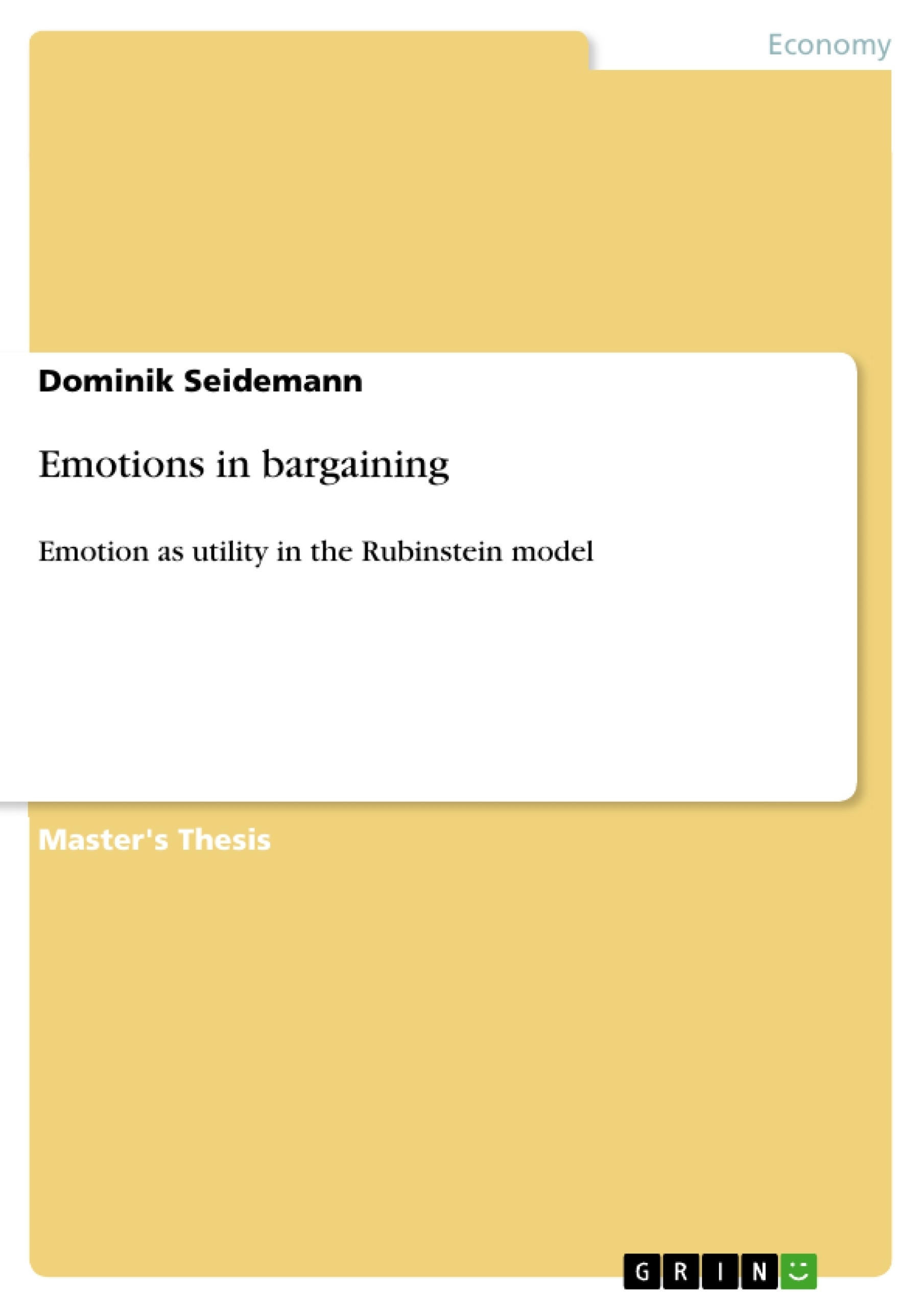
Emotions in bargaining
Masterarbeit, 2014
58 Seiten, Note: 1,7
Leseprobe
Inhaltsverzeichnis (Table of Contents)
- Introduction
- A case of negotiation
- Two possible outcomes and emotions
- Bargaining theory
- An introduction into game theory
- A simple game and dominant strategies
- The Nash equilibrium and the sub-game perfect equilibrium
- Pure and mixed strategies
- Games in bargaining theory
- Cooperative bargaining and the Nash bargaining solution
- The Rubinstein model: a non-cooperative game
- Introduction and example
- Equilibrium
- Implementing alternative utilities
- Uniqueness of equilibrium
- Emotions in bargaining- theory – an overview
- Incorporating fairness into game theory and economics – Matthew Rabin (1993)
- Modeling altruism and spitefulness in experiments – David K. Levine (1998)
- A theory of fairness, competition and cooperation – Ernst Fehr and Klaus Schmidt (1999)
- A theory of equity, reciprocity and competition – Gary E. Bolton and Axel Ockenfels (2000)
- Bargaining with reference dependent preferences –Compte and Jehiel (2003)
- Introducing social norms in game theory – Raúl López-Pérez (2007)
- Bargaining with history-dependent preferences – Duohze Li (2007)
- Strategic extremism: bargaining with endogenous breakdown probabilities and order of play – Elie Appelbaum (2008)
- How to bring emotions into bargaining – feasible models of negotiation for a higher wage
- Comparing two outcomes - a closer look
- Modelling two outcomes
- Possible outcome one: leaving in anger
- Possible outcome two: the terror regime
- A general model for the emotional negotiation for wages
- How a model for emotional bargaining could look like
- An alternative form
- The interplay of emotions and bargaining models in game theory.
- Exploring how to incorporate emotional factors into traditional bargaining models.
- Analyzing the specific negotiation scenario of salary bargaining for a new graduate.
- Developing a model to simulate the impact of emotions on negotiation outcomes.
- Examining the potential implications of emotions for the dynamics of bargaining and its outcomes.
Zielsetzung und Themenschwerpunkte (Objectives and Key Themes)
This master thesis explores the intersection of traditional bargaining models in game theory with various approaches that study the influence of emotions on negotiation outcomes. It draws upon the Rubinstein game as its foundation and delves into the literature that aims to explain observed emotions in experimental bargaining settings, further developing models to account for these observations. The thesis examines the impact of emotions in a specific negotiation situation – salary bargaining for a new graduate – drawing inspiration from the existing literature. It also proposes a model capable of more accurately simulating the outcomes of particular negotiation scenarios.
Zusammenfassung der Kapitel (Chapter Summaries)
The first chapter provides an introduction to game theory, detailing concepts such as dominant strategies, the Nash equilibrium, and sub-game perfect equilibrium. The second chapter examines cooperative and non-cooperative bargaining models, with a focus on the Rubinstein model. It explores the equilibrium solutions and considers the incorporation of different utility functions to represent emotional factors. The third chapter provides an overview of key research on emotions in bargaining, including work by Rabin, Levine, Fehr and Schmidt, Bolton and Ockenfels, Compte and Jehiel, López-Pérez, Li, and Appelbaum. This section highlights the diverse approaches to incorporating fairness, altruism, spitefulness, equity, reciprocity, social norms, and history-dependent preferences into bargaining models.
Schlüsselwörter (Keywords)
The main keywords and focus topics of this thesis include: bargaining theory, game theory, emotions, negotiation, fairness, altruism, spitefulness, equity, reciprocity, social norms, history-dependent preferences, reference-dependent preferences, Rubinstein game, Nash bargaining solution, Nash equilibrium, sub-game perfect equilibrium, strategic extremism, emotional bargaining, salary negotiation.
Details
- Titel
- Emotions in bargaining
- Untertitel
- Emotion as utility in the Rubinstein model
- Hochschule
- Johannes Gutenberg-Universität Mainz
- Note
- 1,7
- Autor
- Dominik Seidemann (Autor:in)
- Erscheinungsjahr
- 2014
- Seiten
- 58
- Katalognummer
- V295055
- ISBN (eBook)
- 9783656933014
- ISBN (Buch)
- 9783656933021
- Dateigröße
- 1098 KB
- Sprache
- Englisch
- Schlagworte
- emotions emotion rubinstein
- Produktsicherheit
- GRIN Publishing GmbH
- Preis (Ebook)
- US$ 19,99
- Preis (Book)
- US$ 29,99
- Arbeit zitieren
- Dominik Seidemann (Autor:in), 2014, Emotions in bargaining, München, Page::Imprint:: GRINVerlagOHG, https://www.diplomarbeiten24.de/document/295055
- Autor werden
- Ihre Optionen
- Vertriebskanäle
- Premium Services
- Autorenprofil
- Textarten und Formate
- Services für Verlage, Hochschulen, Unternehmen

- © GRIN Publishing GmbH.
- Alle Inhalte urheberrechtlich geschützt. Kopieren und verbreiten untersagt.
- info@grin.com
- AGB
- Open Publishing
Der GRIN Verlag hat sich seit 1998 auf die Veröffentlichung akademischer eBooks und Bücher spezialisiert. Der GRIN Verlag steht damit als erstes Unternehmen für User Generated Quality Content. Die Verlagsseiten GRIN.com, Hausarbeiten.de und Diplomarbeiten24 bieten für Hochschullehrer, Absolventen und Studenten die ideale Plattform, wissenschaftliche Texte wie Hausarbeiten, Referate, Bachelorarbeiten, Masterarbeiten, Diplomarbeiten, Dissertationen und wissenschaftliche Aufsätze einem breiten Publikum zu präsentieren.
Kostenfreie Veröffentlichung: Hausarbeit, Bachelorarbeit, Diplomarbeit, Dissertation, Masterarbeit, Interpretation oder Referat jetzt veröffentlichen!
- GRIN Verlag GmbH
-
- Nymphenburger Str. 86
- 80636
- Munich, Deutschland
- +49 89-550559-0
- +49 89-550559-10
- info@grin.com
-









